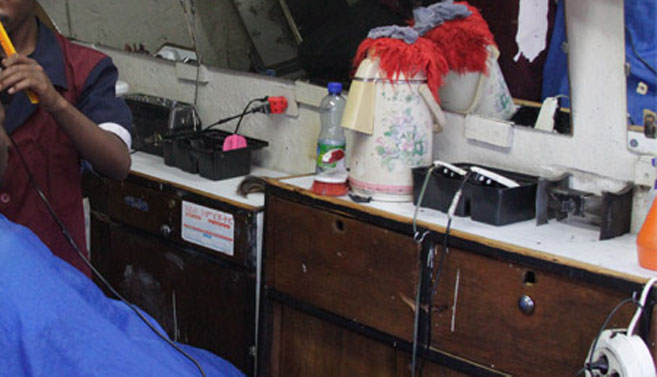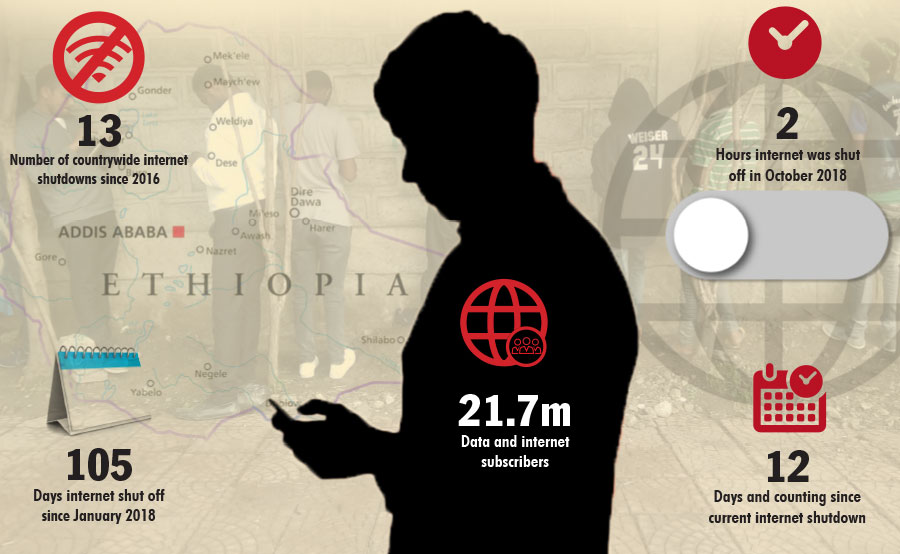
Radar |
May 18 , 2019
Ethiopians are regularly exposed to poor customer service but rarely to rudeness – a condition that is antithetical to their polite disposition, writes Ambessaw Assegued (assegued@anfilo.com).
 Near Tele Bar, near National Theatre, in Addis Abeba, a customer in a suite enters condescendingly into a barbershop and is directed to a chair by a thin-lipped and moustached barber who flicks, twitches and jerks his whiskers in a fashion that communicates general disapproval of his new client.
Near Tele Bar, near National Theatre, in Addis Abeba, a customer in a suite enters condescendingly into a barbershop and is directed to a chair by a thin-lipped and moustached barber who flicks, twitches and jerks his whiskers in a fashion that communicates general disapproval of his new client. Near Tele Bar, near National Theatre, in Addis Abeba, a customer in a suite enters condescendingly into a barbershop and is directed to a chair by a thin-lipped and moustached barber who flicks, twitches and jerks his whiskers in a fashion that communicates general disapproval of his new client.
The customer confidently takes his seat and lays out what he wants done with his hair, “Please even it out and trim it all around. I want all sides to be equal and none of that Kuncho, taper-fade stuff on the top of my forehead.”
The barber’s oval face and unruly whiskers flap ferociously, like the twisting wings of a hummingbird; and several incomprehensible syllables escape from under his moustached lips that were only intelligible to him and his lady assistant.
The assistant hands him his cape and a red nylon gown and grunts her approval of her boss and her disapproval of the customer. A piece of thin cotton fabric is wrapped around the collar, the gown flapped across the upper body and tightly tied around the neck with a measure of intent to make the client cringe with a noticeable discomfort.
But the customer endures, occasionally taking furtive glances at his transforming head in the mirror, while the barber continues quivering his cheeks and moustache as a warning sign to any suggestion by his victim.
Midway through the process, a weak squeal comes from under the head, which is now being held firmly with one hand by the barber, while the other hand holds a vibrating clipper close to the client’s ear.
“Could you trim it around the ear and the back of the head?”
Nothing more was done to the hair and the gown is quickly whisked away. The client - with a prominent kuncho firmly planted on his forehead and the back of his head untrimmed - rises from the barber chair, dusts his clothing, pays an exorbitant fee and leaves the shop without the same confidence with which he walked in.
It is not unusual in Ethiopia for customers to find themselves holding the short end of the stick while dealing with customer service, but it is seldom to be the recipient of rude service. The distinction between poor and rude service is important, since Ethiopians are naturally predisposed to avoid rudeness in their social encounters.
But there is a universal malaise that overhangs customer service, a general attitude conveyed by service providers not to bother them and to leave them alone. This brashness permeates into almost every fabric of the business sector that it is unavoidable to notice. Even when the self-interest of the entrepreneur or the businessperson is directly concerned, providing service to a client is considered a privilege bestowed upon the recipient, not the other way around.
A sleepy, tiny pharmacy with a handful of daily transactions in Kazanchis employs three people who loaf around all day ordering meals, tinkering with their smartphones and engaged in conversations that fill their hours.
During a recent visit, a customer’s prescription is received by one of the attendants who take the note over to the pharmacist, who is sitting behind a desk sipping tea. From her sitting position, the pharmacist issues an order to the attendant and points to a medicine cabinet from which to fetch the drug. The package is wrapped and the client is told to pay the cashier who is sitting just inches away from the attendant.
The transaction done, the customer makes inquiries about the medicine, which arouses the displeasure of the pharmacist, who ignores the client and addresses the attendant curtly: “One tablet every eight hours with meals.”
The customer shuffles out, the staff breathe a sigh of relief, the languid atmosphere is quickly restored and life in the pharmacy returns to its habitual indolence.
There is a recognition in the West that a powerful relationship between customer experience and revenue exist, and businesses view every interaction with their clients as an opportunity to increase satisfaction, build loyalty and grow revenue.
In Ethiopia, brand building and customer loyalty are nonexistent and placed very low, almost at the very bottom of the totem pole of customer services. Here, each transaction between a client and an enterprise is viewed as a discrete event that expires soon after the consummation of the business deal.
There may be the occasional personal loyalties and favours exchanged between clients and the clerks and staff of an enterprise, but the business entity itself devotes almost nothing of its resources to create brand recognition or customer loyalty.
The customer here is viewed as an intruder who is best dispensed of quickly after he or she have paid for whatever service they have received, and whether or not a satisfactory service has been rendered.
Poor service, yes, but rude service is a rare animal in Ethiopia.
“Rudeness is often considered typically French: smelly as cheese, baguettes or drinking red wine at every lunch,” writes Rose Trigg. “The root of the problem is not that the French are rude, it’s that we don’t understand the codes of French conversation."
Therein lie the mystery why a people prone to politeness like Ethiopians show such outright impoliteness in the domains of their businesses. The missing element, the code that protects the customer from a rude proprietor, is to exchange pleasantries before diving into transactions. It may not shield from the mundane, customary poor service one experiences daily, but it may well do to ward off rudeness.
“You can’t have any interaction with the French unless you say bonjour. You say it in a meaningful way, and you give them a chance to say bonjourback,” continues Rose Trigg, solving that existential puzzle.
Ethiopians, just like the French, want to be greeted properly. At least, one should try polite greetings on a rude restaurateur to see if it makes any difference.
PUBLISHED ON
May 18,2019 [ VOL
20 , NO
994]


Radar | Jul 01,2023

Fortune News | Jul 13,2020

Fortune News | Mar 14,2020

Agenda | Jun 17,2023

Radar | Apr 08,2024

Dec 22 , 2024 . By TIZITA SHEWAFERAW
Charged with transforming colossal state-owned enterprises into modern and competitiv...

Aug 18 , 2024 . By AKSAH ITALO
Although predictable Yonas Zerihun's job in the ride-hailing service is not immune to...

Jul 28 , 2024 . By TIZITA SHEWAFERAW
Unhabitual, perhaps too many, Samuel Gebreyohannes, 38, used to occasionally enjoy a couple of beers at breakfast. However, he recently swit...

Jul 13 , 2024 . By AKSAH ITALO
Investors who rely on tractors, trucks, and field vehicles for commuting, transporting commodities, and f...

Sep 13 , 2025
At its launch in Nairobi two years ago, the Africa Climate Summit was billed as the f...

Sep 6 , 2025
The dawn of a new year is more than a simple turning of the calendar. It is a moment...

Aug 30 , 2025
For Germans, Otto von Bismarck is first remembered as the architect of a unified nati...

Aug 23 , 2025
Banks have a new obsession. After decades chasing deposits and, more recently, digita...